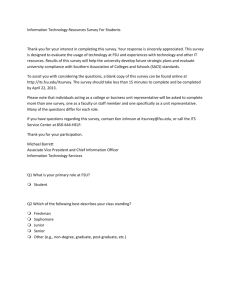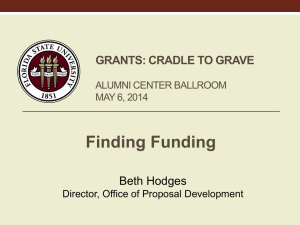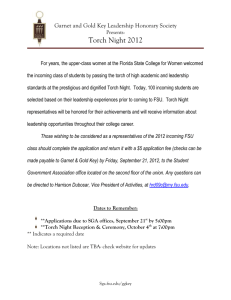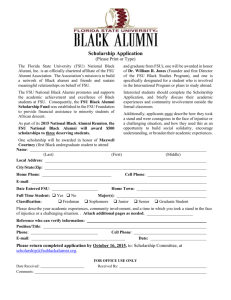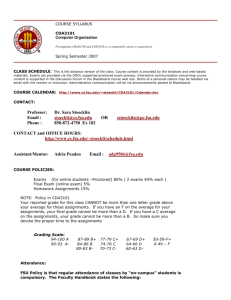Fayetteville State University Academic Affairs Annual Report 2008
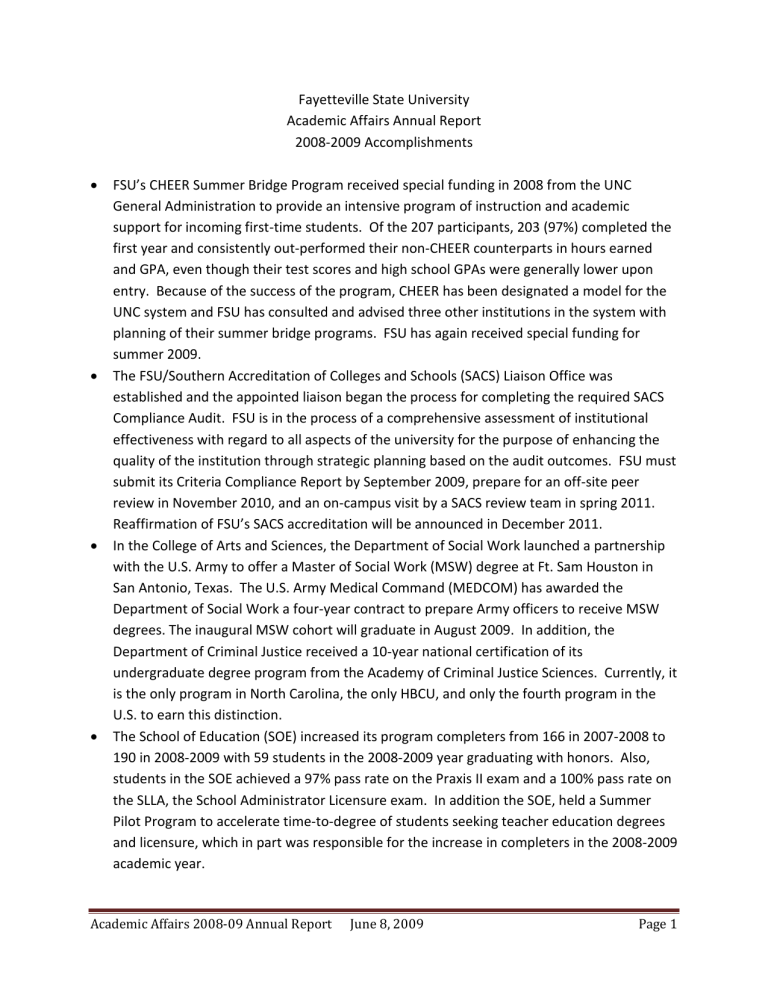
Fayetteville State University
Academic Affairs Annual Report
2008-2009 Accomplishments
• FSU’s CHEER Summer Bridge Program received special funding in 2008 from the UNC
General Administration to provide an intensive program of instruction and academic support for incoming first-time students. Of the 207 participants, 203 (97%) completed the first year and consistently out-performed their non-CHEER counterparts in hours earned and GPA, even though their test scores and high school GPAs were generally lower upon entry. Because of the success of the program, CHEER has been designated a model for the
UNC system and FSU has consulted and advised three other institutions in the system with planning of their summer bridge programs. FSU has again received special funding for summer 2009.
• The FSU/Southern Accreditation of Colleges and Schools (SACS) Liaison Office was established and the appointed liaison began the process for completing the required SACS
Compliance Audit. FSU is in the process of a comprehensive assessment of institutional effectiveness with regard to all aspects of the university for the purpose of enhancing the quality of the institution through strategic planning based on the audit outcomes. FSU must submit its Criteria Compliance Report by September 2009, prepare for an off-site peer review in November 2010, and an on-campus visit by a SACS review team in spring 2011.
Reaffirmation of FSU’s SACS accreditation will be announced in December 2011.
• In the College of Arts and Sciences, the Department of Social Work launched a partnership with the U.S. Army to offer a Master of Social Work (MSW) degree at Ft. Sam Houston in
San Antonio, Texas. The U.S. Army Medical Command (MEDCOM) has awarded the
Department of Social Work a four-year contract to prepare Army officers to receive MSW degrees. The inaugural MSW cohort will graduate in August 2009. In addition, the
Department of Criminal Justice received a 10-year national certification of its undergraduate degree program from the Academy of Criminal Justice Sciences. Currently, it is the only program in North Carolina, the only HBCU, and only the fourth program in the
U.S. to earn this distinction.
• The School of Education (SOE) increased its program completers from 166 in 2007-2008 to
190 in 2008-2009 with 59 students in the 2008-2009 year graduating with honors. Also, students in the SOE achieved a 97% pass rate on the Praxis II exam and a 100% pass rate on the SLLA, the School Administrator Licensure exam. In addition the SOE, held a Summer
Pilot Program to accelerate time-to-degree of students seeking teacher education degrees and licensure, which in part was responsible for the increase in completers in the 2008-2009 academic year.
Academic Affairs 2008-09 Annual Report June 8, 2009 Page 1
• Achievements continued in the AACSB accredited School of Business and Economics (SBE).
The SBE was recognized as one of the Top Business Schools in 2009 by the Princeton
Review. In addition FSU undergraduate and MBA students won the Outstanding Product
Award in their division at the Moot Corp Competition at the University of Texas at Austin.
The Moot Corp is the oldest and most prestigious international business school competition that hosts teams from top-ranked MBA programs around the world. The SBE also sponsored the OFC Venture Challenge Business Plan competition for the second year, a competition that highlights the importance of entrepreneurship and features a National Policy Forum on
Minority Entrepreneurship Education. FSU students won the Best Written Business Plan competition.
• In 2008-2009, the Graduate School was re-established as a separate unit to monitor and direct all post-baccalaureate degree and non-degree programs. In this first year, the school’s focus was to develop an effective organizational structure to manage the unit and contribute to the improvement of recruitment, retention and graduation of its students. As such, a dean, assistant dean, and graduate admissions counselor were hired. In addition, a
Graduate Council was formed to review policies and procedures that involve admissions, programs and curricula, faculty, students, and communications, including the catalog, website and other materials. As part of the re-establishment of the Graduate School, the
Office of Sponsored Research and Programs (OSRP) became a sub-unit of the school.
• The Office of Sponsored Research and Programs (OSRP) reported its 2008-2009 Submissions and Awards Totals as of June 4, 2009, as being the following:
# Submitted to External Funding Agencies
Total Requested Amount:
Total Requested Amount-Title III:
Grand Total Requested:
69
$26,352,744.79
$ 5,044,696.00
$31,397,440.79
Funded Amount: (New and Continuous) $ 6,013,395.21
Funded Amount-Title III: (New and Continuous) $ 5,044,696.00
Grand Total Funded Amount:
Pending Amount:
$11,057,991.21
$21,102,650.29
Not-Funded Amount: $ 7,492,234.00
• In the Extended Learning and Summer Programs unit, that oversees distance and continuing education, 610 online courses were offered serving 11,916 students. An additional 201 courses were offered as part of various collaborative partnerships, including the NC Model
Teachers Education Consortium, Harnett County Reading Courses, UNC-Chapel Hill and NC
Corrections, the Math and Science Education Network, and NC TEACH. In addition, 6,360 students were served through the FSU Summer School and 257 students were served
Academic Affairs 2008-09 Annual Report June 8, 2009 Page 2
through various continuing education and certificate courses. This unit also assisted with
FSU’s existing partnerships with 14 community colleges, two 2+2 agreements, and 19 dual enrollment agreements.
• Academic Affairs, as part of its ongoing review and to respond to UNC Tomorrow, conducted a Productivity Study of Academic Programs and a Review of New Programs, utilizing our revised academic planning and review process. Fifteen (15) degree programs were identified as low-producing of which three were recommended for discontinuation—
Business Education-Secondary, Health Education, and Marketing Education for Teachers— placing the remaining 12 programs on notice that they will undergo internal review in one year to monitor progress toward meeting acceptable productivity standards. Of the nine new programs, two programs had enrollment higher than projected—Fire Science and
Communication—with the remaining seven programs having lower than projected enrollment—Art Education, Criminal Justice, M.A. in Teaching, Biotechnology, Forensic
Science, Nursing, and Management Information Systems. Moreover, at the chancellor’s direction, the admission to the nursing program was placed on hold beginning fall 2009, while the program undergo further review in order to enhance program quality. Also, two new degree programs were submitted for approval to the UNC General Administration—the
B.S. in Intelligence Studies and the Bachelor of Social Work (BSW). In addition, six undergraduate and five graduate degree programs were proposed along with eight certificate programs to the UNC General Administration, with plans for later submission.
• Enrollment Management (Admissions, Financial Aid, and the Registrar) focused on improving the academic profile of the first-year students in fall 2008, upholding the FSU mission to ensure access to underrepresented students, enhancing processes to foster better collaboration with community colleges, and ensuring fiscal solvency in the area of financial aid. As a result, the profile of the fall 2008 new freshmen GPA increased to 2.87 and the SAT to 865, up from 2.77 and 846 in fall 2007. Recruitment of Hispanic students continued with seven events being held, including the first annual “Su Futuro Es Nuestro
Foco” (Your Future Is our Focus) Open House held during National Hispanic Month. In an effort to strengthen recruitment and retention of male students, who represent approximately 30% of the student body, a series of workshops on how to be successful in college entitled “Captain of my Destiny”, were held for prospective and currently-enrolled male students. Another initiative to improve retention involved the Registrar’s Office and the academic departments was the implementation of advisement and registration procedures that required each student to meet with his or her advisor prior to registering for their spring 2009 courses. This effort resulted in a 15-point increase in student satisfaction with advisement. Finally, Financial Aid made outstanding progress for the 2 nd consecutive year toward improving its business procedures as indicated by the improved audit reports each of those years and the NC Office of State Auditors’ decision to eliminate
Academic Affairs 2008-09 Annual Report June 8, 2009 Page 3
the need for any further audit of the 2008-2009 records, which would have been conducted in 2009-2010.
• The Center for Innovative Teaching and Learning (CITL), FSU’s primary resource for supporting faculty development specifically related to improving instructional strategies to enhance student learning, helped infuse a commitment to instructional innovation by presenting more than 100 workshops and lectures with 1,162 attendees drawn from every department in the university. The center also provided ongoing assistance to faculty on an individual basis. In view of its role in supporting instructional improvement to enhance student learning, the center is directly related to the core academic mission of FSU.
• In the Office of Academic Program Planning and Review and Specialized Accreditation, the focus was on faculty and staff development, leadership training, student learning outcomes in the majors, and involvement in university outreach and partnership efforts to strengthen student learning outcomes in the regional, state, and global economies. Nationally renowned experts, such as Dr. Freedman Hrabowski, Dr. Vincent Tinto, Dr. Peggy Maki, and
Dr. Virginia Lee, were brought to campus to work with faculty on staff to improve student learning outcomes, recruitment and retention as part of the Saturday Academy workshops, campus-wide lecture series, and faculty symposia. In addition 87 workshops that focused on faculty development and innovative teaching methods were offered through the FSU Center for Innovative Teaching and Learning (CITL). As part of FSU’s partnership with BRAC RTF, plans for a Center for Defense and Homeland Security, which is to be housed at FSU, progressed well with meetings that involved a delegation including Senator Tony Rand, the
NC Governor’s Office, the NC UNC President Erskine Bowles, FSU Chancellor James
Anderson, FTCC President Larry Keen, BRAC RTF Executive Director and Former U.S. General
Paul Dordal, and others, including the NC Military Business Center, Defense Technology
Business Accelerator (DSTA), NC Military Foundation, and NC Department of Commerce.
• As part of Academic Affairs’ economic transformation activities, a grant award for
$1,419,215 from the U.S. Department of Defense was received to establish the
Southeastern North Carolina Regional Microanalytical and Imaging Center (SENCRMIC), a collaborative effort between FSU and UNC-Pembroke. Significant progress was made this year including renovation of space for the center in the FSU Lyons Science Building that will house the JXA 8500F Electron Microprobe. The center is scheduled to open in fall 2009.
• The Office of Institutional Effectiveness and Title III includes University Testing Services and
Institutional Research. The Testing Center, a major contributor to FSU’s outreach efforts, administered over 8,000 examinations with 75% of those exams being national and regional tests such as PRAXIS, SAT, GRE, and the LSAT. The Institutional Research sub-unit continued collecting, reporting, and distributing the vast amount of institutional data and also assisted departments with special requests, such as the development of a FSU MBA Program
Redesign Interest Survey and a Student Affairs Orientation Program Satisfaction Survey. In
Academic Affairs 2008-09 Annual Report June 8, 2009 Page 4
addition to the fund award of $5,044,696 received in 2008-2009 previously reported previously in the Office of Sponsored Research and Grants section, the Title III sub-unit also worked with federal administrators and Congressional Representatives relative to FSU becoming designated as an HBGI institution, which entitles FSU to receive Title III graduate programs funding. FSU was granted HBGI status.
• The International Education Center, working with various academic departments on campus, finalized five new partnerships. The international institutional partners are ESC
Bretagne Brest, France; Covenant University, Nigeria; University of Abuja, Nigeria; Institute of Social Work, Tanzania; and Baotou Teacher’s College, China. These partnerships will enhance global awareness for our faculty and students, increasing study abroad, teaching, and joint research opportunities. Also, in summer 2009, 18 students including several from the FSU Honors Program and 3 faculty members will participate in a three-week study abroad trip to China.
• The Cross Creek Early High School on the campus of FSU graduated its first senior class with
64 graduates, the highest number of graduates among early high school programs in the state of North Carolina. Eight of the top ten 2009 graduates from CCEHS, including the valedictorian, plan to enroll at FSU.
Academic Affairs 2008-09 Annual Report June 8, 2009 Page 5
